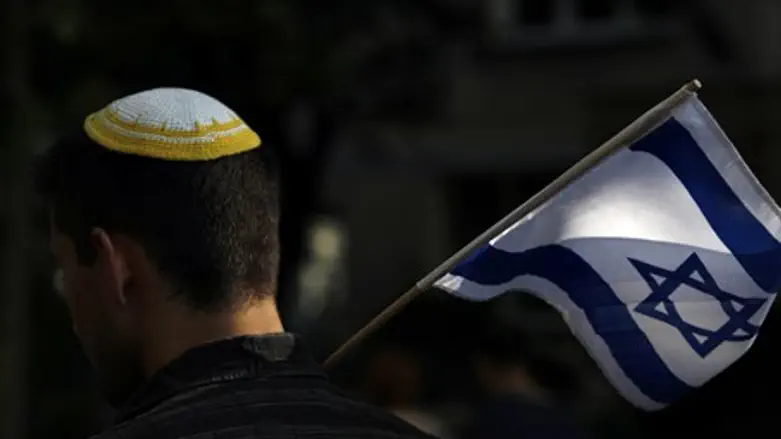
Poland is a black and white country for many Jews. That is not so much because Jews might see Poles as anti-Semites as much as it represents a part of Jewish history that is deep in the past. With the murder of 3 million Polish Jews and additional stories of partisan anti-Semitism during World War II, it is a country that many Jews only ever interact with on trips to haunting landmarks of the holocaust like Auschwitz.
Things are far more nuanced than that though, says Rabbi Yona Daniel Simons of Modi’in, who spent three years based in Warsaw as the Rosh Kollel of Poland.
“When I would travel on the train from Warsaw, I’d open my bag of books and I’d start reading in order to prepare for whatever shiur (class) I was giving that afternoon. The train would empty out over the hour and half trip. They were all fascinated,” says Rabbi Simons, but not to the degree some people might think. “People were highly accepting because the concept of studying Jewish books in Poland is not a new thing. They weren't accepting of it necessarily because they liked Jews. But it was very Polish.”
“If I had done it 30 years ago, the reaction might have been very different.”
Despite the trauma of the Holocaust and the further blows to what Jews remained by communist regulation of communal association and religion itself, Polish political and cultural norms have evolved to become more inclusive of the Jewish minority in daily life.
“I was at a meeting with the President of Poland with another 150 or so other religious leaders,” tells the Rabbi, who highlights that Jews’ extremely low numbers relative to the population would not have made him think his position would be so prestigious to be invited to such an event.
“Everyone there was dressed in their ‘religious uniforms,’” referring to the traditional garb of Christian and Muslim pastors and preachers. "Despite being a 'Rabbi' I was simply dressed formally for meeting the President - with no uniform or sign of authority or position. One person asked me, ‘How do people know to respect you?’ It was very different.”
“I think this is something that people who lead various groups to Poland are not aware of. They simply aren’t aware of Polish people’s attitude. I was given far more respect in Poland than I feel I deserved. It was not something I would expect from Americans, Brits or Australians.”
Alongside a certain unfamiliarity with the Jewish community, there is still a different collective memory of the Jewish community in Poland.
“This is a place where you can get things like ‘kreplach’ or ‘chulent’ on the menu,” says Rabbi Simons, noting that many traditionally Ashkenazi dishes are actually shared with other groups in Eastern Europe and Poland. He compares it with the notion of a ‘bagels-and-lox Jew’ in the United States, saying Poles have a much richer archetype for Jews based on their centuries of scholarship and presence in the country. “They have a different mesorah (tradition) of what Jews are like.”
He notes that Poles aren’t deeply familiar with Jewish culture, but are very conscious of it. He refers to a “tacky” sort of Jewish tourism, complete with gift shops in certain formerly Jewish-majority areas. But still, he points out that it is currently “trendy” in Poland to explore Jewish culture and notes one person with whom he worked who ran a small Jewish cooking course that attracted several paying non-Jewish students.
“They were certainly interested, paying their own money to go to a Jewish cooking class.”
There is a curiosity in modern Polish culture for the aforementioned deeper understanding of Jewish life, from both the members of the reemerging Jewish community and non-Jews as well.
He recalls one “poorly timed” lecture that he was invited to in the late afternoon the eve of Shavuot, where he was invited to follow up a lecture on fighting terrorism with a Jewish perspective on the same topic.
“I pulled out a Maharshal of Lublin (Rabbi Solomon Luria, 1510-1573) commentary. He had a long essay discussing the concept of fighting threats to the community.”
At that point, he noticed that there was far more intrigue for the Maharshal than he had noticed in the past outside of Poland.
“People were excited to hear me quoting from a 16th century Polish academic. This wasn’t about some obscure commentary to the Talmud for someone sitting in a Yeshiva. No, they wanted to hear about the Polish academic from 400 years ago because they hadn’t heard so much about the Polish academics in that era.”
“There are anti-Semitic stories in Polish culture, but there are clearly other kinds of stories (about Jews) with a serious trope.”
But Rabbi Simons did get the occasional uncomfortable question. At one point he says, someone asked him, “How do you feel working in a place where so many Jews died?”
At that moment he smiled and responded, “Many Jews have died in Jerusalem, too.”